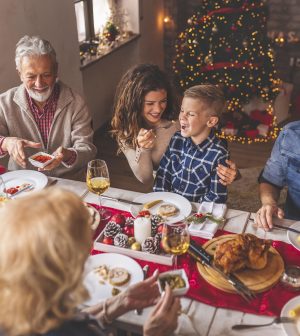- 7 Best Breads for Maintaining Stable Blood Sugar
- Gelatin vs. Collagen: Which is Best for Skin, Nails, and Joints?
- The Long-Term Effects of Daily Turmeric Supplements on Liver Health
- Could Your Grocery Store Meat Be Causing Recurring UTIs?
- Are You Making This Expensive Thermostat Error This Winter?
- Recognizing the Signs of Hypothyroidism
- 10 Strategies to Overcome Insomnia
- Could Artificial Sweeteners Be Aging the Brain Faster?
- Techniques for Soothing Your Nervous System
- Does the Water in Your House Smell Funny? Here’s Why
Coping With Cancer and COVID During the Holidays

Tempting as it is to mingle with friends and relatives, anyone with cancer should take extra precautions this holiday season to avoid COVID-19. Their families also need to be cautious to help protect them, experts say.
Yale Cancer Center reminds people who are living with cancer that the disease and treatments can put a patient at risk for serious illness from the coronavirus, even if they’re fully vaccinated.
This doesn’t mean you can’t enjoy the season — you can, with planning and precautions that make the holidays safer for everyone.
“The most important thing is you need to make sure everyone you’ll be spending time with this holiday season is vaccinated,” said Dr. Kevin Billingsley, chief medical officer at Smilow Cancer Hospital and Yale Cancer Center, in New Haven, Conn.
“Try to avoid parties or large crowds, especially if there is no vaccination requirement to attend, wear a mask, especially indoors, and continue to wash your hands often and stay socially distanced. And consider a Zoom option if possible,” he added.
The U.S. Centers for Disease Control and Prevention has advised that people can get a booster dose of COVID vaccine six months after completing their primary vaccination series.
A third dose of the COVID-19 vaccine is given sooner to people with seriously compromised immune systems, like cancer patients, as part of their initial vaccine series.
“As far as when to get a third dose, the U.S. Food and Drug Administration recommends immunocompromised individuals wait at least 28 days after the second dose is administered before receiving the third dose of an mRNA vaccination series, like the Pfizer or Moderna shots,” Billingsley said in a Yale news release.
Reactions to a booster or third dose are similar to the second dose, according to the CDC. Symptoms are typically mild or moderate fever, body aches, headaches and fatigue.
The new Omicron variant has not changed booster guidelines, but it does strengthen the need for boosters, according to Yale Cancer Center.
“The data is showing the Omicron variant is more highly transmissible than earlier variants, including the Delta variant,” Billingsley said.
But vaccinated people who test positive for the coronavirus are more likely to be asymptomatic or experience a milder illness, research shows.
Billingsley recommends patients reach out to their primary care physician or oncologist with any questions.
More information
The American Cancer Society has more on COVID-19 and cancer.
SOURCE: Yale Cancer Center, news release, Dec. 19, 2021
Source: HealthDay
Copyright © 2026 HealthDay. All rights reserved.










